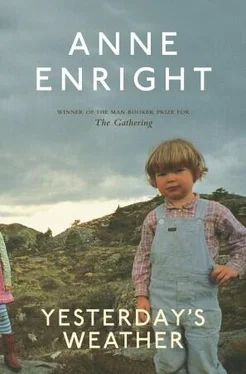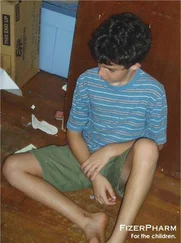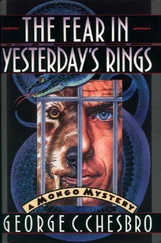Or Jim, this friend of mine who got MS. I met him one day and I started chatting to him of course. And then I found I was talking faster, like really jabbering, because it was him I wanted to talk to — him and not his disease — and he was sliding down the wall in front of me, jabber jabber jabber jabber, until a complete stranger was saying to him, ‘Would you like me to get you a chair?’
I would prefer it if he looked at me, that’s all — the American. Even if I was sliding down the mirrored wall in front of him, even if I was giving birth on the floor. I would prefer it if he looked at the person that I am, the person you see in my eyes. That’s all. I put my hand on my stomach to steady the baby, who was quiet now, enjoying the ride — and silent, as they always are. But sometimes they leave a bubble of air in there, with their needles and so on. They leave air in there by accident and, because of the air, you can hear the baby cry — really hear it. I read that somewhere. It must the loneliest sound.
We are all just stuck together . I felt like telling him that too.
Anyway, what the hell. There was this guy looking at my stomach in the lift on the way up to the seventh floor one Tuesday morning when I had very little on my mind. Or everything. I had everything on my mind. I had a whole new person on my mind, for a start, and the fact that we didn’t have the money really, for this. I had all this to worry about, a new human being, a whole universe, but of course this is ‘nothing’. You are worrying about nothing , my husband says. Everything I think about is too big, for him, or too small.
Of course, he is right. I pick the things off the floor because if I don’t our life will end up in the gutter . I put the tokens from the supermarket away because if they get lost our child will not be able to afford to go to college . My husband, on the other hand, lives in a place where you don’t pick things up off the floor and everything will be just fine. Which must be lovely.
‘It’s perfectly natural,’ he says, when I tell him the trouble I am having with the veins in my legs, or the veins — God help us — in my backside. But sometimes I think he means, We’re just animals, you know . And sometimes I think he means, You in particular. You are just an animal .
By the time we passed the fifth floor I had the sandwich in my mouth. Roast beef, rare, with horseradish sauce. That’s why I was in the lift in the first place, I had just waddled out for a little something, and God, it tasted amazing. I lifted my chin up to make the journey down my throat that bit longer and sweeter, and maybe it was this made him breathe short, like laughing, almost, made me look at him finally, sideways, with my mouth full.
‘Well, that sure looks good,’ he said.
This American laughing at me, because I am helpless with food. And because I look so stupid, and huge, this man I have never met before being able to say to me, ‘Would you mind? May I touch?’
I could feel the lift pushing up under my feet. My mouth was still full of roast beef. But he stretched his hand out towards me, anyway. It looked like a hand you might see in an ad — like that old ad for Rothmans cigarettes — slightly too perfect, as though he was wearing fake tan. I turned around to him, or I turned the baby round to him, massively. I did not look him in the face. I looked sideways a little, and down at the floor.
I wanted to say to him, Who is going to pay for it? Or love it. I wanted to say, Who is going to love it? Or, Do you think it is lonely, in there? I really wanted to say that. I swallowed and opened my mouth to speak and the lift stopped, and he set his hand down. He touched all my hopes.
‘It’s asleep,’ I said.
The doors opened. So we were standing like that, him touching my belly, me looking at the ground, like some sort of slave woman. Thinking about his eyelashes. Thinking that, no matter what I did these days, no matter what I wore or how I did my hair, I always looked poor. Lumbered.
He said, ‘Thank you. You know, this is the most beautiful thing. It’s the most beautiful thing in the whole world.’
Well, he would say that, wouldn’t he.
Kitty was suspicious of the escalator, or more properly the escalators, as there were two of them, one falling and one rising, anchored side by side in the middle of the main shopping floor. She disliked the push of the motor, and under that, the loose, light clacking sound of something she could not analyse. A chain perhaps, that ran freely deep in the machine.
They were new. The space where they appeared had been boxed in for months, floor to ceiling, with cheap wooden panelling, painted blue. First they knocked a hole in the floor, and then another in the ceiling above, she supposed. They worked at night, but even during the day, men came out from behind the panelling, filthy and smiling, and went back in again. Ordinary Dublin men who worked whenever, and installed escalators in the middle of the night. She wondered how much they were paid.
Kitty tried to take to them, but she couldn’t. She was disturbed by the sight of them out among the merchandise. She disliked the way they talked to each other loudly and laughed as if they owned the shop. They interrupted the conversation, somehow. You’d be selling a bed, talking about springs, you’d be with a young couple, pushing into the mattress in a cosy sort of way, and who would stroll past but the lean blond one, maybe, with the dirty-looking tan, adjusting his zip on the way back from the loo.
Not that she minded men. She had two grown sons at home, so she was used to it: the cheerfulness, the indifference and the mess. Though sometimes she turned around in the kitchen and was shocked by the sheer size of them — all that protein and carbohydrate, the muscle and milk of them, as though she had fed a couple of potted plants, and grown triffids.
Then one morning, she walked in and the men were gone. The place was perfect; the carpets fresh and new, the hoarding dissolved into thin air and, in the middle of the floor, a pair of escalators, one going up and the other coming down. The steps tugged lightly at each other as they passed, snagging and loosening all day long. It ticked in the corner of her eye, making her feel balanced, or dizzy, depending on the light. They were so clean. The up escalator always mounting itself, step over step, the down escalator falling like syrup; burying itself slowly in the flatness of the floor.
They were beautiful and they never stopped and finally they got on her nerves. Nothing happened in the bed department. People bought a bed, or they did not buy a bed. Kitty used to like the open space, the hummocky slabs of mattress, the headboards like tombstones in a giant graveyard. ‘Who’s been sleeping in my bed?’ But all her satisfaction was gone, now. The way people lay down and curled up, in the middle of the crowd. The old couples sitting on either side of the mattress and looking over their shoulders at each other in a way that was almost coy; the giggles and the silences. Most people buying a bed were in love, she used to think, or hopeful at least of finding love. Now, they just bounced up and down, or put their dirty feet up, or looked as though they could kill for a decent night’s sleep.
Kitty was at home one evening, washing the dishes, when the phone rang. It was a young man who said he was looking for a Kevin Daly. She was listed as K. Daly in the phone book, and Kitty didn’t want to give too much away. She said there was no Kevin Daly at that number and the young man asked was she sure. He said that he was looking for a Kevin Daly he used to know, a man who had gone to school in Malahide. ‘I’m sorry,’ Kitty said, but they were talking to each other now. He told her that Kevin Daly was his brother, long out of touch. Then he said that, actually, Kevin Daly was his father, but that he did not know he was his father, at least he did not know that he was his son. He said he was looking for his father because his mother was sick and that was why she had given him his father’s name, finally — Kevin Daly — and the fact that he’d gone to school in Malahide. It was a schooltime romance, he said. Kitty just said, ‘Sorry,’ a lot, the way you might say, ‘I see.’
Читать дальше












